It’s been interesting to watch Bobby Drake unsteadily make his way through life as a newly-out gay man in Sina Grace’s Iceman series. He’s very much the same Iceman who’s been cracking wise with the X-Men since the ’60s, and yet he’s also a vastly different Bobby who’s grappling with a new sort of emotional struggle.
Though Bobby has told a number of people throughout Marvel’s books about his sexuality, his coming out — like most people’s — has been a gradual process. The more comfortable he has become with acknowledging and accepting his identity, the more open he’s become with others. But, for all of the personal growth that Bobby’s gone through as a result of his being honest with his loved ones, the spectre of coming out to his parents has been lurking around the periphery of Iceman since its very first issue.
In no uncertain terms, Iceman has framed Bobby’s fear of rejection by his family as the first big bad of the series and, this week, Bobby’s facing his demons head on.

The circumstances leading to Bobby’s coming out are a bit convoluted, but understanding them is key to understanding the ways in which Iceman‘s story is both significant and at times deeply disappointing.
In 2012’s All-New X-Men #1, the adult Beast of the present day travels into the past to recruit the original five X-Men on a mission to stop adult Cyclops. As these young X-Men come to grips with seeing how their future selves’ lives played out, young Jean Grey (who’s new to her telepathy) inadvertently reads young Bobby’s mind and discovers that he’s been living in the closet. Over the course of the series, Bobby gradually warms to the future and the idea of living openly as a gay teenager in an age where his queerness doesn’t necessarily carry the same kind of burdens it did back in his original time.
Eventually, young Bobby confronts his older self about their lives and older Bobby tearfully admits that he’s gay as well and that he’s proud of his younger self for being so mature for his age.
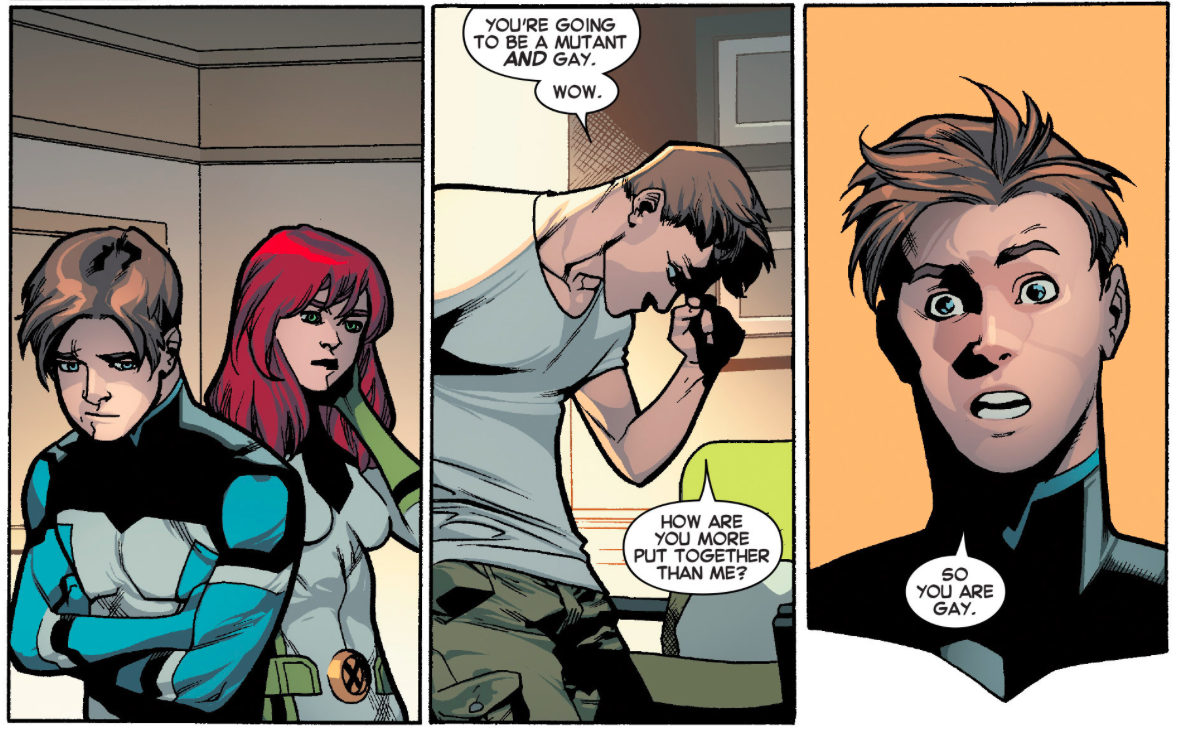
Since then, young Bobby’s been off doing the sort of thing that super kids do — gallivanting with his fellow X-Teens and dating an Inhuman named Romeo. Older Bobby, by comparison, has been trying to successfully embody a new identity for himself while also maintaining all of the others that’ve come along with adulthood.
There’s always been Bobby the teacher and Bobby the X-Man. Now there’s Bobby the gay man, and it’s this newest self that Iceman has struggled to define in a way that’s felt meaningful. Bobby often says and does simple things that let you know he’s gay — he’s on Marvel’s answer to Grindr and he’s flirted with Wolverine’s son Daken — and yet the things that define Bobby’s queer identity have always felt rather nebulous save for his coming out-related anxiety. We know that Bobby’s gay because of the things that he says, but not exactly because of the things he does. It’s been more telling than showing.
To be fair, this is one of the most difficult things about bringing a character’s queerness to the surface in any story: Getting past the flat statement of identity and into a space where the elements of their personality begin to shape their queerness into something unique. But that’s exactly what a series like Iceman should be chiefly concerned with, considering how prominent a queer character such as Iceman is for Marvel as a publisher.
For all of the buildup to Bobby’s coming out, the actual scene of him coming out to his parents is rather humdrum, which is both a good and a bad thing. Bobby straight-up tells his folks that he’s gay and they’re… flabbergasted, with just a hint of anger thrown in for good measure. In a lot of ways, it’s a familiar, if somewhat darker, riff on Bobby’s original “coming out” as a mutant scene in Bryan Singer’s X2: X-Men United.
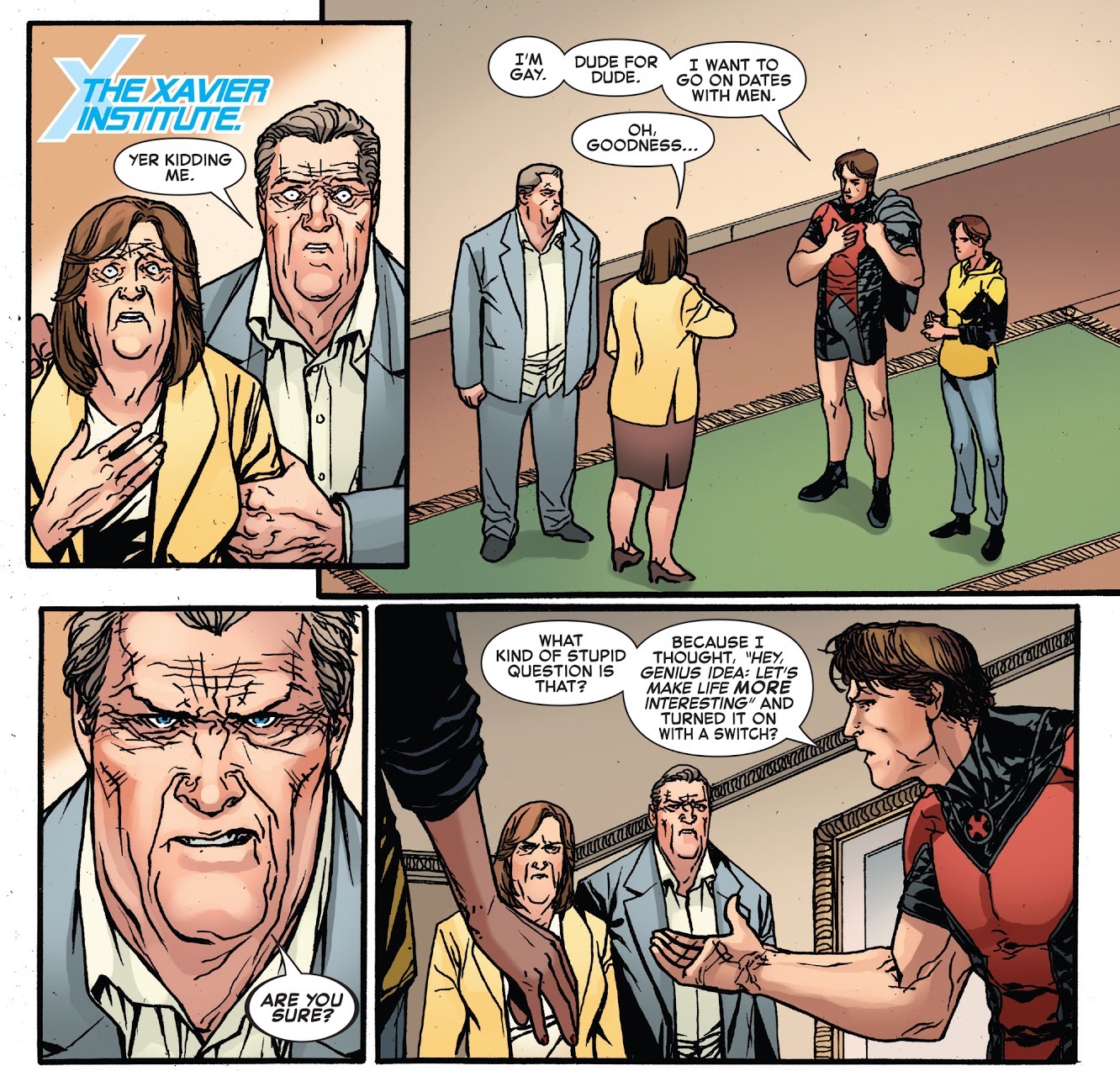
It’s exactly the kind of reaction that so many of us are familiar with, not exactly because they’re reflective of our own experiences, but because it’s a fairly textbook sort of coming out that’s rather overdone across the majority of queer media. In almost every LGBTQ-focused YA novel, television show and movie, there’s the dreaded coming-out scene involving a lot of tears and high-strung emotions. Doors may be slammed, voices may be raised, and there’s a very solid chance that at least one person will storm out of a room.
These scenes are both very much grounded in reality and, in an undeniable way, contain some of the most narratively uninteresting parts of queer media. Often times, they prioritise telling a story that’s sort of universally relatable rather than creatively unique. Everyone’s coming out story is different, but the way that we as a culture tell coming out stories tends to be rather uniform. That doesn’t have to be a case — especially in a book like Iceman that’s so chock full of potential.
Bobby’s parents immediately fly into an argument, blaming one another for which of them made Bobby gay. They then direct their anger at Bobby himself, confronting him about his past girlfriends. Bobby tries to reason with them that none of his other relationships have worked out specifically because he’s never been straight and, of course, his parents refuse to listen. On some level, this fight gestures at the idea that, deep down, the Drakes must acknowledge that they have never really known their son’s true self. Fearing this new Bobby, they’re desperately grasping for older versions of him that they thought they understood.
But the weird thing about the newest issue of Iceman is the fact that there’s literally a version of Bobby from the past who’s conspicuously missing from this entire ordeal.
Older Bobby doesn’t try at all to involve his younger self in his coming out, and that feels like an odd decision given the truly novel situation that the two Icemen are in. There are all sorts of things about the Bobbys’ relationship to one another that have yet to be unpacked in a meaningful way. This lack of interaction makes it feel like something crucial is missing from Iceman. Older Bobby has spent years repressing who he is and younger Bobby has come rather recently from a point in time where he couldn’t have dreamed of coming out. They are the same person and yet they are fundamentally different from each other.
Coming out as a teen has changed young Bobby’s life for the better, in ways that are different from how coming out later in life has helped older Bobby. But, between the two of them, the common denominator is that accepting their queerness has made them both stronger, better people. That’s exactly the sort of idea that any queer person in Bobby’s position could express to his parents, but Iceman instead choses to go a more familiar route.
Forever the man being interrupted, Bobby skates off to deal with a sudden attack from the Juggernaut in this week’s issue #5. It’s during that fight that Grace briefly gives us a peek at what Iceman could still end up becoming as it fully settles into its voice. As Iceman and Juggernaut go back and forth and trade blows, Bobby channels the frustration he feels towards his parents into a power that demonstrates just how much he’s grown as a person. He’s able to summon and control a gang of moving ice golems effortlessly and his static ice constructs are both complex and expertly deployed. Older Bobby’s exercising a command of his powers that’s only been hinted at before and Grace hits the nail on the head when Juggernaut literally crushes Iceman’s body into a fine powder, seemingly killing him.
Almost immediately, though, Iceman literally pulls himself together from his vaporised form, complete with a set of ice wings, and promptly tosses Juggs off into the distance as if he’s nothing. The pressure, buildup and release of Bobby’s emotions are all captured on a single page that pushes the character into a new place that marks a change for him.
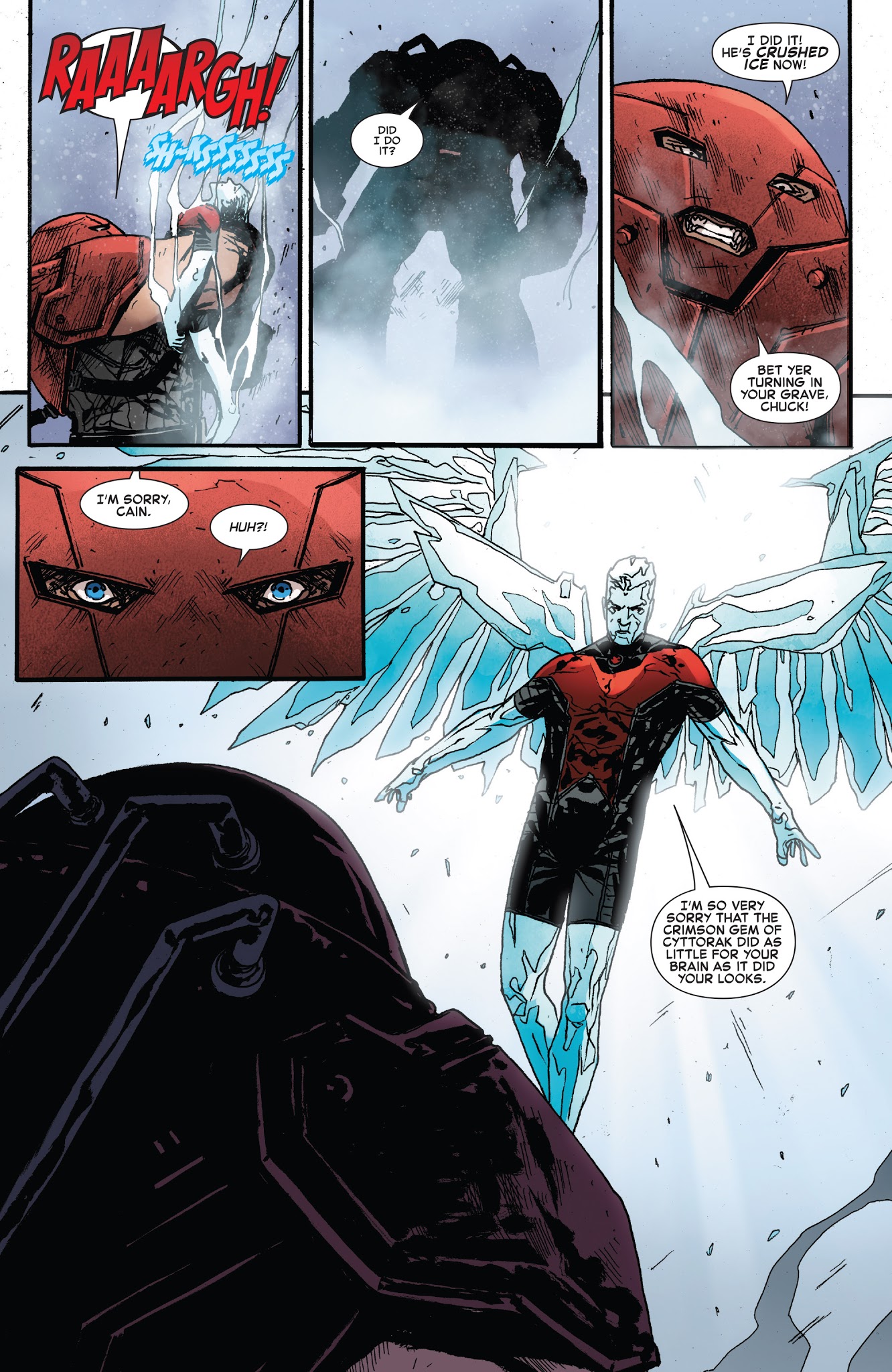
It’s… odd that the most interesting moment of Bobby’s coming out happens during a fight with the Juggernaut. On the one hand, of course it does; this is an X-Men book, where everyone’s lives are weird. At the same time, though, the novelty of Bobby’s shattering as a metaphor for his ultimate re-centring draws attention to just how stereotypical the rest of his coming-out arc reads on the page.
While Bobby’s fighting, his parents read a letter he’d written to them explaining all of the thoughts and feelings he couldn’t quite bring himself to verbalise. He tells them that he’s realised how living his life to please others has held him back and that he’s finally ready to prioritise his needs and feelings. His father, in his way, understands, and tells Bobby that he still loves him before walking off into a gentle snowfall.
We’re living in an interesting time for the representation of LGBTQ people across a variety of media. Queer people have never been more explicitly present in pop culture for general audiences, and yet for all the progress that’s been made there are still a number of issues, some of them relatively new, that have to be taken into consideration when telling new queer stories. There are more gay characters on screen than there were 10 years ago, and yet the vast majority of these characters are cisgender white men, a lot like Bobby Drake.
All queer stories are worth telling, yes, but there’s also something to be said for recognising the fact that, when it comes to queer-focused narratives, some stories are wildly overrepresented. This doesn’t mean that stories about gay white men are any less important, but rather that stories about them (especially fictional ones) should strive to do something innovative that continues the process of broadening the idea of what stories about queer people look like. We’ve seen the tortured white guy struggling to come out so many times. Mix it up a little.
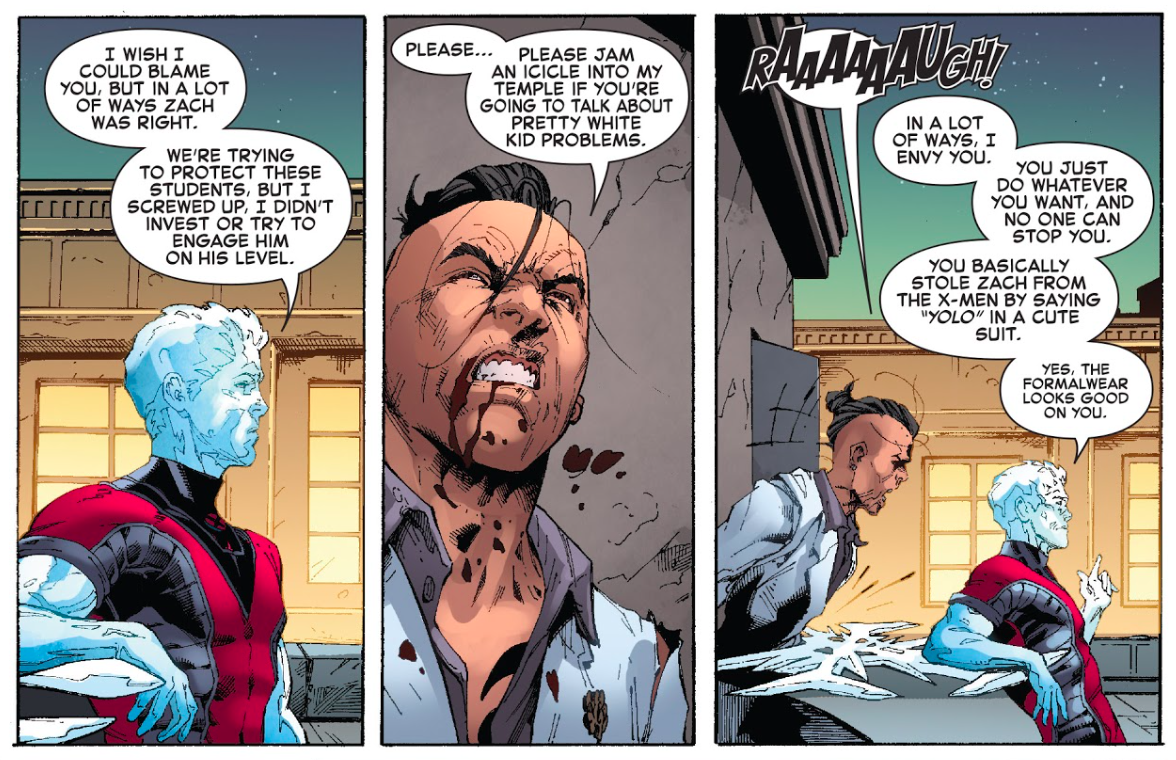
That, so far, has been my biggest issue with Iceman — the fact that many of the beats that it hits feel familiar, like a rerun of an old television show that you’ve seen countless times before. Iceman‘s flatness is thrown into even sharper relief when you compare it to a book like Marvel’s America, which explores its titular character’s sexuality in a way that feels fresh, not just as a comic book, but as a piece of media that isn’t a part of the grander queer canon.
Iceman is a story about a man tapping into his true potential for the first time in his entire life. It’s just rather disappointing that this is the first time that it feels as if the story’s actually known that about itself.
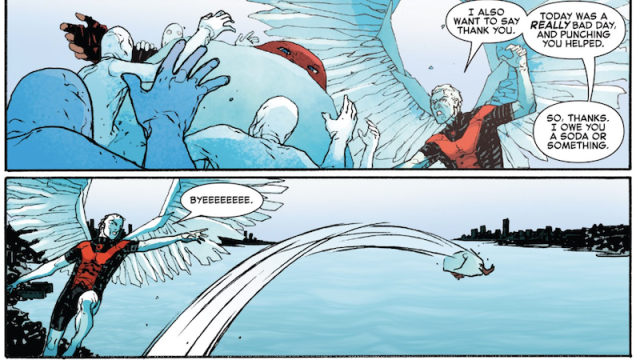
Comments